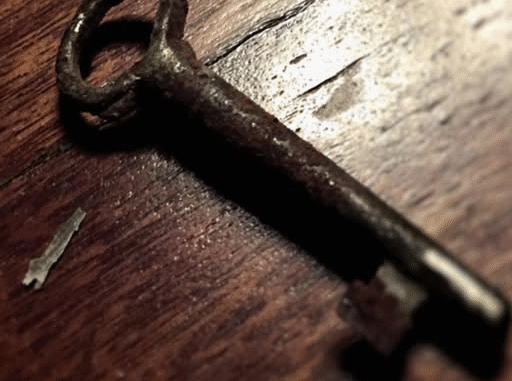
When my father passed away, I didn’t expect much. I knew my cousins would get the big things — the workshop, the lake house, the vintage Cadillac he’d always protected like a treasure. And I was okay with that. I had been there for him through every hospital visit, every sleepless night, every moment he forgot my name. I didn’t need possessions to prove I loved him.
But then the lawyer handed me a velvet box.
Inside was a single, rusted key — dull, old, with no label, no explanation.
“To Evelyn… a key.”
That was it.
No house. No money. Just this tiny, corroded piece of metal.
I held it in my palm like it was a punchline. Behind me, someone whispered, “That’s cold.” Another laughed.
My cousin Daniel sat beside me later and offered me ten thousand dollars for it — casually, like he was buying a vintage pen.
Ten thousand. For a key?
Daniel — who once argued with a waitress over a $3 tip.
Something was wrong.
And that’s when I knew: this key wasn’t junk. It was a key to something real. Something dangerous.
And someone in my family already knew what it opened.
I couldn’t let it go.
So I set a trap.
I invited everyone to dinner — a “last toast” for Dad. I made sure the key was visible on the hallway table, right in the path to the bathroom.
They came. Smiling. Drinking. Talking about their inheritances like it was a game show.
Rachel bragged about the lake house. Daniel mentioned selling tools from the workshop. Kyle gloated about the Cadillac.
No one mentioned Dad.
But I wasn’t there for grief. I was there for truth.
That night, after they all fell asleep in my living room and spare bedrooms, I waited.
At 1:03 a.m., I heard footsteps.
The key was gone.
I followed the figure down the street — not in a car, but on foot, keeping my distance. They headed to the abandoned industrial zone — a place Dad used to take me as a child, where he’d point at crumbling buildings and say, “People see ruins. I see possibility.”
The figure stopped at a warehouse wall, tapped a pattern — twice high, once low — and a hidden panel slid open.
I froze.
This wasn’t just a key.
It was access.
I slipped in behind them — and stepped on something dry.
Crunch.
They turned.
But it wasn’t Daniel.
It was his father — my Uncle Lewis.
The quiet, hunched man who barely spoke at family dinners.
Now, under the dim light, he stood tall, strong, his arms thick with muscle. The man who played the background had been hiding in plain sight.
“You shouldn’t have followed me,” he said, calm and cold.
“That’s my key,” I shot back. “I should be here.”
He led me to a steel safe in the back. My father’s key fit perfectly.
Inside was a leather folder, tied with twine — decades of work, buried and forgotten.
Uncle Lewis told me the truth: he and my father had spent three years designing a massive underground tunnel — a private project with a huge payout. But when my father realized the construction would destabilize the city’s historic foundations, he refused to hand over the plans.
He didn’t just walk away.
He leaked the project to the press.
The deal collapsed. Lawsuits followed. They lost everything.
And my father? He didn’t stop. He kept refining the designs — secretly — not to destroy, but to preserve. To build a future without sacrificing the past.
“He hid them,” Lewis spat. “Like I was nothing.”
Now, he had a buyer — a developer who didn’t care about history, only profit.
And he was going to sell the plans.
I tried to stop him.
But he was stronger. Faster. He shoved the folder into a backpack and called for Daniel.
Then Daniel stepped into the light — hoodie down, face pale.
I thought they were in it together.
But then… he winked at me.
He peeled off his hoodie, slipped the fake folder over it like a sleeve, and quietly handed me the real one — the documents, the legacy, the truth.
“Hide it,” he whispered. “Lock it up. And get that key into a bank vault. Fast.”
He was helping me.
Against his own father.
Because he had recorded everything — ten minutes of Lewis’s confession. And he wasn’t afraid to use it.
A month later, I found an investor who believed in my father’s vision — not the destructive one, but the better one. We launched the project under my name. No demolition. No shortcuts. Just innovation with respect.
The city approved it unanimously.
I didn’t just inherit a key.
I inherited purpose.
A legacy.
And a cousin I once doubted — who turned out to be the only one who truly understood what my father was trying to protect.
Sometimes, the smallest things unlock the biggest truths.